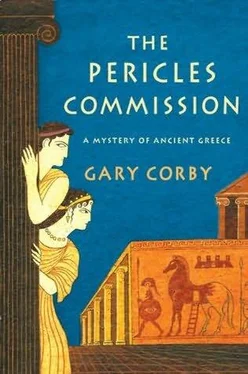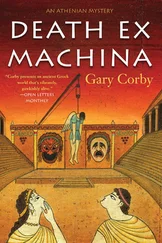Gary Corby - The Pericles Commission
Здесь есть возможность читать онлайн «Gary Corby - The Pericles Commission» весь текст электронной книги совершенно бесплатно (целиком полную версию без сокращений). В некоторых случаях можно слушать аудио, скачать через торрент в формате fb2 и присутствует краткое содержание. Жанр: Исторический детектив, на английском языке. Описание произведения, (предисловие) а так же отзывы посетителей доступны на портале библиотеки ЛибКат.
- Название:The Pericles Commission
- Автор:
- Жанр:
- Год:неизвестен
- ISBN:нет данных
- Рейтинг книги:5 / 5. Голосов: 1
-
Избранное:Добавить в избранное
- Отзывы:
-
Ваша оценка:
- 100
- 1
- 2
- 3
- 4
- 5
The Pericles Commission: краткое содержание, описание и аннотация
Предлагаем к чтению аннотацию, описание, краткое содержание или предисловие (зависит от того, что написал сам автор книги «The Pericles Commission»). Если вы не нашли необходимую информацию о книге — напишите в комментариях, мы постараемся отыскать её.
The Pericles Commission — читать онлайн бесплатно полную книгу (весь текст) целиком
Ниже представлен текст книги, разбитый по страницам. Система сохранения места последней прочитанной страницы, позволяет с удобством читать онлайн бесплатно книгу «The Pericles Commission», без необходимости каждый раз заново искать на чём Вы остановились. Поставьте закладку, и сможете в любой момент перейти на страницу, на которой закончили чтение.
Интервал:
Закладка:
“What if that man is already married?”
“Then the law requires him to divorce so as to marry the widow. Keeping property within the family overrides all other considerations. The man would retain his own property and acquire that of Ephialtes. The divorced woman would be sent back to her family.”
This struck me as being somewhat harsh. But fortunately that wasn’t my problem. My problem would be finding the name of the lucky groom.
“It couldn’t have been Cimon who killed Ephialtes, could it?” a man speculated.
Archestratus chuckled. “Cimon? He’s an arch-conservative, no man is more aristocratic, and he and Ephialtes hated each other with a passion, but have you forgotten he was ostracized three months ago? We won’t see him back in Athens for nigh on ten years. How he could fire a bow on the Rock of the Areopagus when he isn’t even in Attica is an interesting question.”
Nevertheless, the suggestion was a good one. Cimon was our greatest living military commander, and the son of Miltiades, who led us to victory at the Battle of Marathon. With credentials like those, he was a hero to many, and as Archestratus said, was known for his deep conservative views, so deep that he was friend and admirer of the strange, militaristic city-state Sparta, Athens’ greatest rival for domination of Hellas. Yes, indeed, if Cimon were in Athens he would be a prime suspect.
But he wasn’t in Athens, nor anywhere in the Attica region surrounding, because the previous year, Cimon had led a party of volunteers to go to the aid of the Spartans when they suffered a slave revolt. The expedition had ended in a farce when the Spartans sent home the Athenian contingent as not required. The people were incensed by the insult, blamed Cimon, and had taken out their indignation by ostracizing him.
I said, “What if Cimon hired an agent to act for him?”
“I don’t believe it,” another man spoke up. “Cimon wouldn’t kill a man like that. He’d face you down.” Others around the room nodded their heads.
“Where is Cimon now?” someone asked.
Silence. Nobody knew where he’d gone. That wasn’t so strange since he’d only recently departed. No doubt he would surface in a few months after he’d found a new home. Cimon had been the only man capable of stopping Ephialtes. The moment he was gone, Ephialtes had pushed through his reforms.
“Maybe one of Cimon’s friends is acting on his own,” someone suggested.
“I suppose that’s possible,” Archestratus conceded. “But if you’re right, there’s going to be another murder.”
“What!”
“Oh, yes. It was Ephialtes who wanted Cimon’s political destruction, but the man who prosecuted him after the Spartan disaster was Pericles.”
It was only after the door shut behind me that I realized I’d never asked Archestratus the one question I’d gone there to ask: Where had he been at the time of the murder? I shook my head in disgust with myself. How could I have let him get away with that? Xanthippus had called Archestratus a little dog who liked to nip but couldn’t hurt, but having met the man I thought there was plenty of bite in Archestratus. The difference between them was, if Xanthippus was a hunting dog that came at you from in front and went for your throat, then Archestratus was the kind that pounced onto your back from behind.
I considered Archestratus’ rather clever backhanded suggestion that Pericles might be the killer. But if he was, I had to get around my own evidence that he held no bow, and besides, why would he commission me to catch himself?
It had all looked so simple when I’d questioned the slaves!
Archestratus had dropped a broad hint that all was not well in Ephialtes’ private life. I decided to visit his home, where I’d be able to ask about his family, and perhaps even discover if there was a relative who hated him.
The home was easy to find, since such a public figure had a long line of mourners visiting. I pushed my way through the crowd, which began even outside the door.
The public rooms held some decent dinner couches, but nothing opulent. The cups men held were standard pottery. There were murals on the walls, the usual Homeric scenes, but nothing like what I would have expected in the home of such a famous man. Indeed, our own house held better artwork, and that confused me. Ephialtes would not have been a rich man, not compared to an aristocrat like Xanthippus, who owned many estates and probably a silver mine, but he should have been very comfortable compared to most. So where was his money? It certainly wasn’t in this house.
Everything was overshadowed by the most important display, the body of Ephialtes. As is the custom, he had been carried straight home from the murder scene. The body had been washed in perfumed water and seawater and laid to rest in the courtyard, with his feet pointing toward the door.
I stepped forward to the body, as was required. An urn of ashes had been placed there. I dipped my hands in, raised them high above me, and poured a handful of ash over my head, felt the soft falling touch against my face, and the harsh burnt smell in my nose. Looking down I could see the pattern of black and white specks on the floor all about me, where every visitor before had done the same thing. I cried and lamented for the shortest time I decently could, inspecting the body all the while. Ephialtes had been dressed in a white shroud. A honey cake rested by his right hand. A strip of linen had been tied around his chin to the top of his head to keep his mouth shut, by which I knew the coin, an obol, had already been placed in his mouth. Ephialtes would give the coin to Charon the Ferryman, who would carry him across the Acheron, the river of woe, on his way to Hades. He would cross the river Cocytus of lamentation, and the Phlegethon of fire, before coming to the river Lethe, where he would dip in his hand and drink of the waters, and so lose all memories of his earthly life, finally coming to the Styx, the river of hate, after which he would be in Hades, and remain there for all eternity.
Death, my death, was not something I had ever contemplated before, but looking down at this man whose death I was investigating, knowing what he was going through that very moment, I wondered for the first time what my own fate might be. The great hero Achilles of Trojan fame had said he would rather be slave to the poorest man living than king over all the dead, and he should know. Achilles’ word was enough to tell me being dead was a bad idea.
When I felt I’d lamented sufficiently I stepped back.
Without a son in the home there was no one to greet the mourners, so they wandered, poking their noses about the home of a famous man, talking to each other, and picking up and inspecting anything that took their interest. I wouldn’t be surprised if a few items disappeared before the day was out.
We could all hear the wailing from the women’s quarters, particularly shrill from one voice, whom I guessed would be the wife. It is against all decency for a married woman to socialize with men, and the husband being dead is no excuse for breaking the rule. Ephialtes’ wife and any girl-children would not leave their quarters until all the visitors had left. Equally, the custom was that they must keep the wailing going to show their distress. It set my teeth on edge, and the men talking to one another had to raise their voices to be heard above it.
I hadn’t fully appreciated how confused this house would be. How was I going to get any information here?
A slave was hobbling about with difficulty, serving wine. The slave was thin, almost weedy. His hair was falling out, and he had the look of illness rather than old age.
He was struggling to carry the amphora. It almost slipped from his grasp and I barely grabbed it in time.
Читать дальшеИнтервал:
Закладка:
Похожие книги на «The Pericles Commission»
Представляем Вашему вниманию похожие книги на «The Pericles Commission» списком для выбора. Мы отобрали схожую по названию и смыслу литературу в надежде предоставить читателям больше вариантов отыскать новые, интересные, ещё непрочитанные произведения.
Обсуждение, отзывы о книге «The Pericles Commission» и просто собственные мнения читателей. Оставьте ваши комментарии, напишите, что Вы думаете о произведении, его смысле или главных героях. Укажите что конкретно понравилось, а что нет, и почему Вы так считаете.












